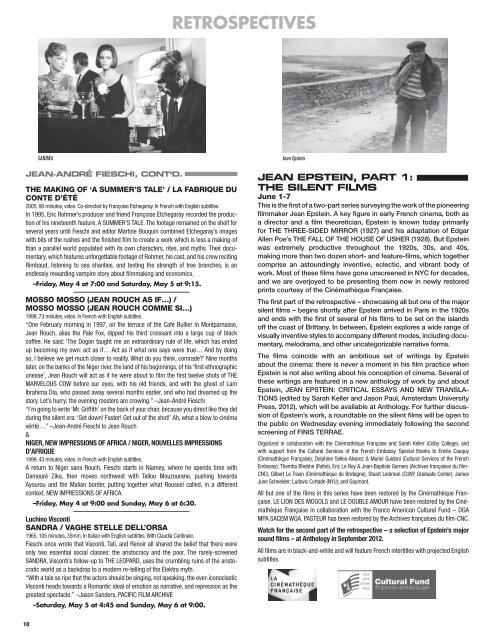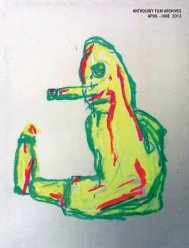ANTHOLOGY FILM ARCHIVES April - June 2012
ANTHOLOGY FILM ARCHIVES April - June 2012
ANTHOLOGY FILM ARCHIVES April - June 2012
Create successful ePaper yourself
Turn your PDF publications into a flip-book with our unique Google optimized e-Paper software.
10<br />
retrOspectiVes<br />
SANDRA Jean Epstein<br />
JeAn-AnDrÉ Fieschi, cont’D.<br />
THE MAKING OF ‘A SUMMER’S TALE’ / LA FABRIQUE DU<br />
CONTE D’ÉTÉ<br />
2005, 90 minutes, video. co-directed by Françoise Etchegaray. In French with English subtitles.<br />
In 1995, Eric Rohmer’s producer and friend Françoise Etchegaray recorded the production<br />
of his nineteenth feature, A SUMMER’S TALE. The footage remained on the shelf for<br />
several years until Fieschi and editor Martine Bouquin combined Etchegaray’s images<br />
with bits of the rushes and the fi nished fi lm to create a work which is less a making-of<br />
than a parallel world populated with its own characters, rites, and myths. Their documentary,<br />
which features unforgettable footage of Rohmer, his cast, and his crew reciting<br />
Rimbaud, listening to sea shanties, and testing the strength of tree branches, is an<br />
endlessly rewarding vampire story about fi lmmaking and economics.<br />
–Friday, may 4 at 7:00 and saturday, may 5 at 9:15.<br />
–––––––––––––––––––––––––––––––––––––––––––––––––––––––––––––––––––––––––––––––––––––<br />
MOSSO MOSSO (JEAN ROUCH AS IF…) /<br />
MOSSO MOSSO (JEAN ROUCH COMME SI…)<br />
1998, 73 minutes, video. In French with English subtitles.<br />
“One February morning in 1997, on the terrace of the café Bullier in Montparnasse,<br />
Jean Rouch, alias the Pale Fox, dipped his third croissant into a large cup of black<br />
coffee. He said: ‘The Dogon taught me an extraordinary rule of life, which has ended<br />
up becoming my own: act as if… Act as if what one says were true… And by doing<br />
so, I believe we get much closer to reality. What do you think, comrade?’ Nine months<br />
later, on the banks of the Niger river, the land of his beginnings, of his ‘fi rst ethnographic<br />
unease’, Jean Rouch will act as if he were about to fi lm the fi rst twelve shots of THE<br />
MARvELOUS cOW before our eyes, with his old friends, and with the ghost of Lam<br />
Ibrahima Dia, who passed away several months earlier, and who had dreamed up the<br />
story. Let’s hurry: the evening roosters are crowing.” –Jean-André Fieschi<br />
“I’m going to write ‘Mr. Griffi th’ on the back of your chair, because you direct like they did<br />
during the silent era: ‘Get down! Faster! Get out of the shot!’ Ah, what a blow to cinéma<br />
vérité…” –Jean-André Fieschi to Jean Rouch<br />
&<br />
NIGER, NEW IMPRESSIONS OF AFRICA / NIGER, NOUVELLES IMPRESSIONS<br />
D’AFRIQUE<br />
1999, 43 minutes, video. In French with English subtitles.<br />
A return to Niger sans Rouch. Fieschi starts in Niamey, where he spends time with<br />
Damouré Zika, then moves northwest with Tallou Mouzourane, pushing towards<br />
Ayourou and the Malian border, putting together what Roussel called, in a different<br />
context, NEW IMPRESSIONS OF AFRIcA.<br />
–Friday, may 4 at 9:00 and sunday, may 6 at 6:30.<br />
–––––––––––––––––––––––––––––––––––––––––––––––––––––––––––––––––––––––––––––––––––––<br />
Luchino Visconti<br />
SANDRA / VAGHE STELLE DELL’ORSA<br />
1965, 105 minutes, 35mm. In Italian with English subtitles. With claudia cardinale.<br />
Fieschi once wrote that visconti, Tati, and Renoir all shared the belief that there were<br />
only two essential social classes: the aristocracy and the poor. The rarely-screened<br />
SANDRA, visconti’s follow-up to THE LEOPARD, uses the crumbling ruins of the aristocratic<br />
world as a backdrop to a modern re-telling of the Elektra myth.<br />
“With a tale so ripe that the actors should be singing, not speaking, the ever-iconoclastic<br />
visconti heads towards a Romantic ideal of emotion as narrative, and repression as the<br />
greatest spectacle.” –Jason Sanders, PAcIFIc <strong>FILM</strong> ARcHIvE<br />
–saturday, may 5 at 4:45 and sunday, may 6 at 9:00.<br />
JeAn ePstein, PArt 1:<br />
the silent Films<br />
<strong>June</strong> 1-7<br />
This is the fi rst of a two-part series surveying the work of the pioneering<br />
fi lmmaker Jean Epstein. A key fi gure in early French cinema, both as<br />
a director and a fi lm theoretician, Epstein is known today primarily<br />
for THE THREE-SIDED MIRROR (1927) and his adaptation of Edgar<br />
Allen Poe’s THE FALL OF THE HOUSE OF USHER (1928). But Epstein<br />
was extremely productive throughout the 1920s, 30s, and 40s,<br />
making more than two dozen short- and feature-fi lms, which together<br />
comprise an astoundingly inventive, eclectic, and vibrant body of<br />
work. Most of these fi lms have gone unscreened in NYC for decades,<br />
and we are overjoyed to be presenting them now in newly restored<br />
prints courtesy of the Cinémathèque Française.<br />
The fi rst part of the retrospective – showcasing all but one of the major<br />
silent fi lms – begins shortly after Epstein arrived in Paris in the 1920s<br />
and ends with the fi rst of several of his fi lms to be set on the islands<br />
off the coast of Brittany. In between, Epstein explores a wide range of<br />
visually inventive styles to accompany different modes, including documentary,<br />
melodrama, and other uncategorizable narrative forms.<br />
The fi lms coincide with an ambitious set of writings by Epstein<br />
about the cinema: there is never a moment in his fi lm practice when<br />
Epstein is not also writing about his conception of cinema. Several of<br />
these writings are featured in a new anthology of work by and about<br />
Epstein, JEAN EPSTEIN: CRITICAL ESSAYS AND NEW TRANSLA-<br />
TIONS (edited by Sarah Keller and Jason Paul, Amsterdam University<br />
Press, <strong>2012</strong>), which will be available at Anthology. For further discussion<br />
of Epstein’s work, a roundtable on the silent fi lms will be open to<br />
the public on Wednesday evening immediately following the second<br />
screening of FINIS TERRAE.<br />
Organized in collaboration with the cinémathèque Française and Sarah Keller (colby college), and<br />
with support from the cultural Services of the French Embassy. Special thanks to Emilie cauquy<br />
(cinémathèque Française); Delphine Selles-Alvarez & Muriel Guidoni (cultural Services of the French<br />
Embassy); Themba Bhebhe (Pathé), Eric Le Roy & Jean-Baptiste Garnero (Archives françaises du fi lmcNc),<br />
Gilbert Le Traon (cinémathèque de Bretagne); Stuart Liebman (cUNY Graduate center), James<br />
<strong>June</strong> Schneider; Ludovic cortade (NYU); and Gaumont.<br />
All but one of the fi lms in this series have been restored by the cinémathèque Française.<br />
LE LION DES MOGOLS and LE DOUBLE AMOUR have been restored by the cinémathèque<br />
Française in collaboration with the Franco American cultural Fund – DGA<br />
MPA SAcEM WGA. PASTEUR has been restored by the Archives françaises du fi lm-cNc.<br />
Watch for the second part of the retrospective – a selection of Epstein’s major<br />
sound fi lms – at Anthology in September <strong>2012</strong>.<br />
All fi lms are in black-and-white and will feature French intertitles with projected English<br />
subtitles.




